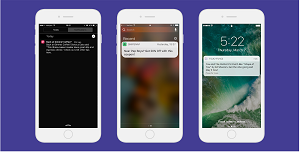News
Foursquare Launches Pilgrim SDK for Mobile Location Intelligence
- By David Ramel
- March 7, 2017
Foursquare is opening up its homegrown Pilgrim SDK to let third-party mobile developers build apps using the company's location intelligence technology.
The Pilgrim SDK builds on the company's years of experience in smartphone location awareness in order to provide services such as contextually relevant reminders to improve day-to-day experiences such as traveling, dining and socializing.
In other words, it provides the technology that recognizes when a user has entered an airport and sends a notification about places in the airport the user might be interested in visiting based on past experiences, without having to log in to an app, check in with a service or do anything else to trigger the functionality.
What's more, the location intelligence technology in the Pilgrim SDK is used with the company's large database of location data that it has acquired from years of operating social services such as the Foursquare City Guide and Foursquare Swarm, which gamifies social interactions ("Want to meet up with friends? Just open Swarm to see who's hanging out nearby."). Both of those and other company products are powered by Pilgrim.
Before making the Pilgrim SDK generally available to all third-party developers, Foursquare is following up on a private beta to open the technology up to a limited audience for further testing and fine-tuning.
 [Click on image for larger view.]
Sample Pilgrim-Generated Notifications (source: Foursquare)
[Click on image for larger view.]
Sample Pilgrim-Generated Notifications (source: Foursquare)
"Now we're opening up this Foursquare superpower -- the ability to precisely understand where phones go in the real world in real-time -- so select partners can license it for use in their own apps," company exec Steven Rosenblatt said in a blog post last week.
"The technology works seamlessly with marketing automation tools, so that brands and marketers will be armed with the ability to send messages to their users at the right time and right place, thanks to Pilgrim SDK's contextual, real-world awareness and robust analytics," Rosenblatt continued. "This all improves the customer journey, too, as consumers continue to expect smarter and more relevant brand experiences, always."
 [Click on image for larger view.]
Mapping the Pulse of New York, Tokyo, Istanbul and London As Seen from Mobile Phones (source: Foursquare)
[Click on image for larger view.]
Mapping the Pulse of New York, Tokyo, Istanbul and London As Seen from Mobile Phones (source: Foursquare)
Foursquare said the Pilgrim SDK isn't just one technology, but rather a collection of technologies that have been in the works for about six years, including:
- The Foursquare database (7 billion check-ins at 80 million places around the world).
- Stop detection (has the person stopped at a place, or is the person just stopped at a traffic light?).
- "Snap-to-place" (given a lat/long, Wi-Fi, and other sensor readings, at which place is the person located?)
Client-side power management (do this all without draining your battery!).
- Content selection (given that someone has stopped at an interesting place, what should we send you?).
- Familiarity (has the person been here before? have they been in the neighborhood? or is it their first time?).
Foursquare exec Dennis Crowley provided some sample use cases for the technology in his own blog post.
"The Pilgrim SDK will give developers the ability to add contextual awareness to their apps," Crowley said. "For example: Did this phone just walk into a bar, a butcher, or a coffee shop? Was this phone inside a gym, a clothing store, or a sandwich shop earlier today? Is this phone inside a Dunkin' Donuts or a Target right now? The Pilgrim SDK is manifestation of our original 'a check-in button you never have to press' vision.
"It's an idea we believe will empower developers to create the next generation of contextually-aware services, whether those are software bots (that will learn about you based on the places you bring your phone); location-aware games (games that change based on where you play them; characters that power-up based on where you bring them); health and fitness apps that adapt based on where you ate lunch or how much time you spent at the gym, or the thousands of other big ideas we expect developers to dream up."
Developers wanting to help dream up such ideas are invited to check out the company's Web site and contact it to apply for a Pilgrim SDK commercial license. No pricing details were provided.
About the Author
David Ramel is an editor and writer at Converge 360.